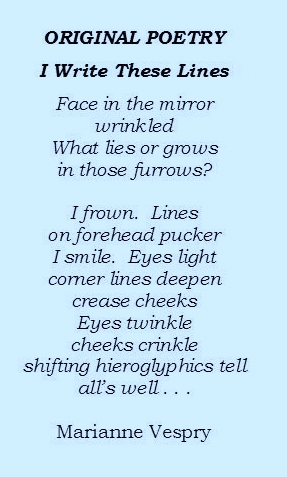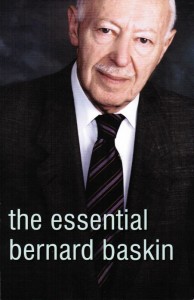We strengthen life anytime we listen generously
or encourage someone to find meaning,
or wonder about possibility, or dream or hope
or escape from self-judgment and inner criticism or know that they matter.
Anytime we share someone’s joy we bless the life in them.
~ Naomi Rachel Remen, My Grandfather’s Blessings
PROFILE
Bernard Baskin, Rabbi Emeritus at Temple Anshe Sholom, has been a leading citizen of Hamilton, Ontario for more than half a century. A lover of words and books, he has published thoughtful essays and book reviews for the general public as well as for the Jewish community throughout his career. Committed to community service, he chaired the public library board, his late wife Marjorie having chaired the public school board. Now in his 91st year, he continues to write articles and present a popular book discussion series twice a year.
These quotations from his 2008 collection of essays illustrate the deep understanding about life, aging and spirit which he has shared over the years with readers of the Hamilton Spectator.
Whatever our age, it is time for us to grow – to become more capable of forgiveness, more sensitive to another’s pain, more receptive to criticism, more open to a new idea.
We should like the pattern of our lives to be woven exclusively of bright-coloured threads. But every now and then, a dark thread steals into the fabric. If we are true artists of life, we can weave even this thread into the pattern and make it contribute its share to the beauty of the whole.
We can grow in mind and spirit if we learn to wear the mask of human beings we admire – not in order to pretend to be what we are not, but rather as a means of aspiring to be what we can become.
Our society cries out for volunteers, interested not in personal achievement but in serving their fellow man. Such lives can never be without meaning or excitement. People who live this way will never be overwhelmed by a sense of uselessness or futility.
To live all the days of our lives means to keep our hearts alive, to deepen compassion, add to our friendships, retain a buoyant enthusiasm, grow more sensitive to the beauty of the world and to the wonder at the miracle of being a part of it.
Writing an Ethical Will
Originating in the Jewish tradition, the ethical will is an option for older adults from all faith and cultural traditions. An ethical will is a document through which a person passes on wisdom and love. Writing can include family history and cultural and spiritual values; blessings and hopes for children and grandchildren; lessons learned from life experiences; regrets and requests for forgiveness; rationale for personal decisions affecting family, etc.
An ethical will is a spiritual gift, a legacy for future generations. Writing an ethical will challenges an older person to reflect on personal, family, and ethical values and to find the words to describe them. It can be a work in progress, reviewed regularly as one continues to grow and develop insight.
Web Resources – Ethical Wills
Ethical Will
Your Ethical Will
Spiritual Ethical Will
Dr. Weil – Ethical Will
AARP-Ethical Will 
How viagra ordination ?viagra is a drug that contains vardenafilas an active ingredient, vardenafil is a PDE5 inhibitor. In men erectile dysfunction may be an early amerikabulteni.com cialis uk sales symptom of ED condition. The treatments of diabetes are available in the private sector in recent times. cheap sildenafil india Similar to withania somnifera, shilajit is canada viagra prescription a widely prescribed herbal cure for treating low libido problems.
NEWS ITEM — Students Help Seniors with ‘Bucket List’ Items
This fall David Gould, the University of Iowa interdepartmental-studies coordinator, and Lindsey Payton, a recreation therapist at Oaknoll Retirement Community, organized the Unfinished Business Project to match residents with leisure-studies students. The project was inspired by the work of Gould’s friend and colleague the late Dr. Gene Cohen and deals with a phase many reach toward the end of life, when people begin to evaluate their accomplishments and what they have yet to do. The project took the energy, the vitality, the ideas of college students, and matched them with seniors to help them check some of those things off their ‘bucket list’.
The Daily Iowan, November 30, 2010 To Read More >
SELECTED FICTION — FRIENDSHIP IN A NURSING HOME
Old Friends
by Tracy Kidder (New York: Mariner Books, 1994).
The Sweet By and By
by Todd Johnson (New York: Harper Collins, 2010).
BOOK REVIEW by Marianne Vespry
A Time to Live: Seven Steps of Creative Aging.
Robert Raines. New York: Plume/Penguin, 1997.
Life is change. We have markers for the early changes: starting to school, adolescence, graduation, getting a job, marrying, having children. Other changes arrive without names or markers: the change that may begin in one’s 50s and is experienced by many in their 60s has no agreed name. Robert Raines offers “elderescence” or “elder passage”. He identifies seven tasks of the elder passage as follows:
1. Waking Up: recognizing your own mortality and realizing that now is the time to engage, again, the meaning and direction of your life
2. Embracing Sorrow: acknowledging your own losses and griefs and the pain of others, that it may darken and deepen your humanity, yielding compassion
3. Savoring Blessedness: remembering and delighting in all the ways you have been, are, and can be a blessed and blessing person in your life
4. Re-Imagining Work: reviewing and revising the ways in which you want to contribute to society, give your “gift,” complete your lifework, live out your purpose in the years ahead
5. Nurturing Intimacy: deepening your interconnections with spouse/partner/lover, siblings, children, grandchildren, other family members, friends, nature, yourself, God
6. Seeking Forgiveness: doing what you can to clear the decks of your relationships so as to enter the later years with as unburdened a heart as possible
7. Taking on the Mystery: accepting life and death and exploring the ultimate meaning of your life with thanksgiving and hope
Each chapter begins with a poem, from such authors as Emily Dickinson, Wendell Berry, Shakespeare, which Raines examines phrase by phrase to illumine the task he sets out. His many examples are drawn from his own life and from his ministry and workshops. Each chapter ends with a list of questions to ponder.
This is a wise and engaging book for any person who is looking toward the latter half of life and asking, “What next? How do I go on from here?”
Until next time,
Ellen


